Documents
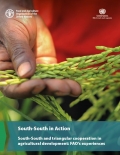
04 Aug 2022
This publication outlines key features of South-South and Triangular Cooperation (SSTC) and how FAO has applied SSTC to the delivery of its mission. The case studies presented provide a window on how SSTC has contributed to alleviating hunger and malnutrition in countries across the global South and has helped build resilience in the face of climate change and other development challenges. The lessons learned from these experiences are feeding into the new FAO SSTC Guidelines for Action (2022–2025) and will guide FAO's future results-based SSTC programmes.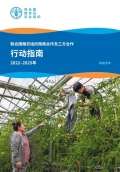
19 Jul 2022
在过去二十年间,联合国粮食及农业组织(粮农组织)将南南 合作及三方合作视为促进农业发展、粮食安全、农村发展、减少贫 困和营养改善的关键交付模式。自2012年以来,粮农组织加强了 对南南合作及三方合作的支持,随着南南合作及三方合作在粮农 组织内逐步制度化,其项目规模也在不断扩大。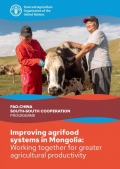
26 May 2022
Sustainable agricultural development lies at the very heart of FAO’s mission to achieve food security and ensure that people everywhere have regular access to enough high-quality food to lead active and healthy lives.
Agrifood systems are driven by the men and women whose daily lives are dedicated to working on the land and on waters and to managing food systems. Their skills, toil and years of accumulated experience are the backbone of food systems — they propel communities and countries. The efforts of agricultural workers represent a vital force moving us towards achieving the Sustainable Development Goals (SDGs) of the United Nations 2030 Agenda for Sustainable Development. South-South...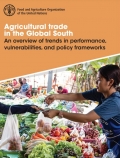
04 Apr 2022
The importance of South countries in global agrifood markets and trade has been increasing over the last two decades, with growth in their participation, as both exporters and importers, having outpaced that of North countries. South countries, as a group, are net exporters of fruits, vegetables, fats and oils, and tropical products such as coffee, tea, cocoa and sugar, and net importers of key food commodities such as cereals, meat and dairy products. These patterns reflect structural changes along the development path. Agricultural productivity growth has fuelled expansion in the production of some products, while population growth and urbanization, rapid economic growth and...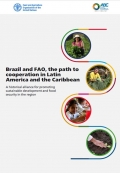
01 Apr 2022
In 2008, due to the growing interest of other developing countries in learning about successful Brazilian policies in the area of food and nutrition security (FNS) and agriculture, the Brazilian Government initiated a partnership with the Food and Agriculture Organization of the United Nations (FAO) to share Brazil's experience through South-South cooperation, based on FAO's comparative advantages.
Under the scope of this partnership, the implementation of Trilateral South-South Cooperation projects for the benefit of developing countries in Latin America and the Caribbean and Africa began in 2012, with technical support from Brazilian Cooperating Institutions (BCIs) such as the National Fund for Educational Development...